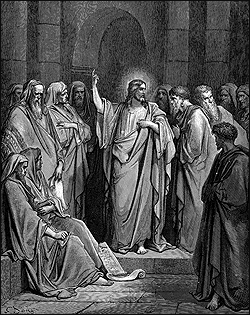
Home > Jesus > The I AMs of Jesus The “I AMs” of JesusThe Lord explains exactly who He is The book of John in the New Testament emphasizes the deity of Jesus Christ and His equivalence with God. From the opening verses, where the eternal Word is equated with God and Jesus is identified as the Word, the theme of Christ's divinity is developed throughout the course of the book and highlighted by recurring instances of the title "I AM." I AM is a traditional name of God that reflects His self-existent and eternal nature, first disclosed to Moses during the burning bush encounter documented in Exodus. Moses wanted to be able to give the Israelites a name by whose authority he would lead them out of bondage in Egypt, and God says to tell them “I AM has sent me to you.” It is a name that declares the highest authority and existence of being, and was understood that way by the Jewish people; it can only refer to the one, true God. About 1,500 years later Jesus arrives and uses I AM to proclaim His deity, identifying Himself distinctly as the one, true God incarnate, equivalent to and unified in essence with the Father. In John’s gospel there are seven I AM statements that appear as metaphors reflecting His role in man’s salvation. The illustrations provide great insight to the Person of Christ and His role in securing fallen man’s redemption and eternal future. These are examined further in the studies linked at right. By declaring Himself I AM and indicating His sameness with God, Jesus drew a strong negative response from the Jewish leadership of the day. John records the escalating dispute between Jesus and the religious establishment on the central issue of His identity, which reaches a crescendo at John 8:58. Here, in response to their accusations of blasphemy, Jesus affirms that He is the One from everlasting to everlasting whose day their father Abraham rejoiced to see. This verse does not present a metaphorical illustration of Christ’s redemptive work like the other I AMs, but stands as a strong and certain proclamation of deity in the face of a religious orthodoxy that did not know God. It was not received well. Like the Pharisees back then, there are religious people today who are resistant to the true things of God. They are incapable of grasping and accepting the realities of God’s kingdom, particularly its sole point of entry - Christ Jesus. John’s gospel and the I AM statements it records declare and illustrate the important truth that Jesus is Lord, and that it is through Him alone that anyone can claim redemption from sin, reconciliation to God, and the abundant, eternal life that awaits the believer.
|
• The Bread of Life |
|
| |
Scripture Alone • Faith Alone • Grace Alone • Christ Alone • To the Glory of God Alone
Most scripture quotations taken from the New American Standard Bible® (NASB)
